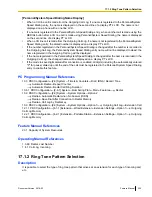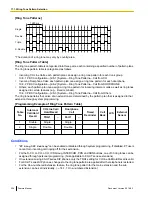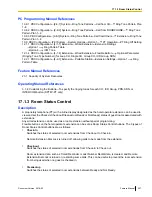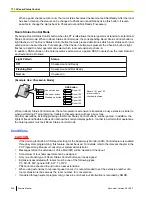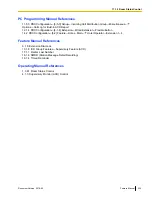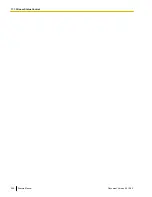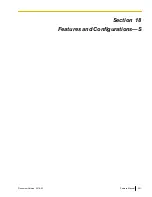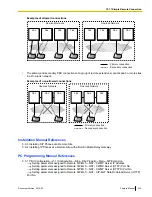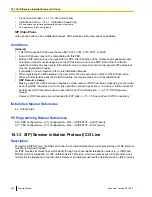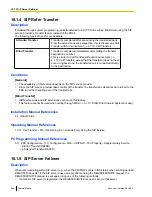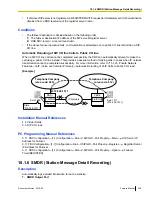
When a guest checks out of a room, the room status becomes Checked-out and Not Ready. After the room
has been cleaned, the status can be changed to Checked-out and Ready using this button. It is also
possible to change the status back to Checked-out and Not Ready if necessary.
Room Status Control Mode
Pressing a Room Status Control button when the PT is idle allows the hotel operator extension to enter Room
Status Control mode. When in Room Status Control mode, the corresponding Room Status Control button’s
light flashes red. The Room Status Control button that was pressed determines which room status each room
extension can be switched to. For example, if the Check-in button was pressed, the Check-in button’s light
flashes red and the hotel operator can select which room extensions to check-in.
In addition, DSS buttons on the hotel operator’s extension or a paired DSS Console show the room status of
each extension as follows:
Light Pattern
Status
Off
Checked-out and Ready
Flashing Red
Checked-out and Not Ready
Red on
Checked-in
[Example Use: Checked-in Mode]
Room101
DSS button
Room102
Room103
Room104
Room105
Check-in button
Check-out button
Rooms 101 and 103
are currently in
checked-in status.
Cleaned-up button
When in Room Status Control mode, the hotel operator’s extension is treated as a busy extension, similar to
when performing PT programming. Callers to that extension will hear a busy tone.
All other operations, including pressing other Room Status Control buttons, will be ignored. In addition, the
lights of fixed and flexible buttons do not show their normal display pattern. In order to perform other operations,
the hotel operator must exit Room Status Control mode.
Conditions
CAUTION
If the Call Log for Built-in ACD Report setting for the Supervisory Monitor (ACD) Control feature is enabled
through system programming, this feature cannot be used. For details, refer to the relevant chapter in the
PC Programming Manual or consult your system administrator.
•
Messages left on the extension’s Voice Mail (VM) will be cleared at Check-out.
•
A maximum of four hotel operators can be assigned.
•
Only one of each type of Room Status Control button can be assigned.
•
Extensions associated with rooms must be one of the following types:
PT, KX-UT SIP, general SIP, SLT, T1-OPX
PSs cannot be checked in and out as room extensions.
•
When using extensions to represent guest rooms, it is recommended to set the extension number of a
room extension is the same as the room number, for convenience.
•
If enabled through system programming, check-in and check-out information is recorded by SMDR.
338
Feature Manual
Document Version 2016-03
17.1.3 Room Status Control
Summary of Contents for KX-NS1000
Page 15: ...Section 1 For Your Safety Document Version 2016 03 Feature Manual 15...
Page 18: ...18 Feature Manual Document Version 2016 03 1 1 1 For Your Safety...
Page 19: ...Section 2 Features and Configurations A Document Version 2016 03 Feature Manual 19...
Page 36: ...36 Feature Manual Document Version 2016 03 2 1 8 Automatic Time Adjustment...
Page 37: ...Section 3 Features and Configurations B Document Version 2016 03 Feature Manual 37...
Page 44: ...44 Feature Manual Document Version 2016 03 3 1 2 BGM Background Music...
Page 45: ...Section 4 Features and Configurations C Document Version 2016 03 Feature Manual 45...
Page 89: ...Section 5 Features and Configurations D Document Version 2016 03 Feature Manual 89...
Page 122: ...122 Feature Manual Document Version 2016 03 5 1 18 DSP Resource Usage...
Page 123: ...Section 6 Features and Configurations E Document Version 2016 03 Feature Manual 123...
Page 137: ...Section 7 Features and Configurations F Document Version 2016 03 Feature Manual 137...
Page 159: ...Section 8 Features and Configurations G Document Version 2016 03 Feature Manual 159...
Page 165: ...Section 9 Features and Configurations H Document Version 2016 03 Feature Manual 165...
Page 172: ...172 Feature Manual Document Version 2016 03 9 1 6 Hot Line...
Page 173: ...Section 10 Features and Configurations I Document Version 2016 03 Feature Manual 173...
Page 217: ...Section 11 Features and Configurations K Document Version 2016 03 Feature Manual 217...
Page 220: ...220 Feature Manual Document Version 2016 03 11 1 1 KX UT Series SIP Phones...
Page 221: ...Section 12 Features and Configurations L Document Version 2016 03 Feature Manual 221...
Page 228: ...228 Feature Manual Document Version 2016 03 12 1 4 Local Alarm Information...
Page 229: ...Section 13 Features and Configurations M Document Version 2016 03 Feature Manual 229...
Page 237: ...Section 14 Features and Configurations O Document Version 2016 03 Feature Manual 237...
Page 252: ...252 Feature Manual Document Version 2016 03 14 1 9 Operator Features...
Page 253: ...Section 15 Features and Configurations P Document Version 2016 03 Feature Manual 253...
Page 331: ...Section 16 Features and Configurations Q Document Version 2016 03 Feature Manual 331...
Page 333: ...Section 17 Features and Configurations R Document Version 2016 03 Feature Manual 333...
Page 340: ...340 Feature Manual Document Version 2016 03 17 1 3 Room Status Control...
Page 341: ...Section 18 Features and Configurations S Document Version 2016 03 Feature Manual 341...
Page 364: ...364 Feature Manual Document Version 2016 03 18 1 12 Syslog Record Management...
Page 365: ...Section 19 Features and Configurations T Document Version 2016 03 Feature Manual 365...
Page 385: ...Section 20 Features and Configurations U Document Version 2016 03 Feature Manual 385...
Page 443: ...Section 21 Features and Configurations V Document Version 2016 03 Feature Manual 443...
Page 448: ...448 Feature Manual Document Version 2016 03 21 1 2 Virtual PS...
Page 449: ...Section 22 Features and Configurations W Document Version 2016 03 Feature Manual 449...
Page 459: ...Section 23 Appendix Document Version 2016 03 Feature Manual 459...
Page 481: ...Document Version 2016 03 Feature Manual 481 Notes...












